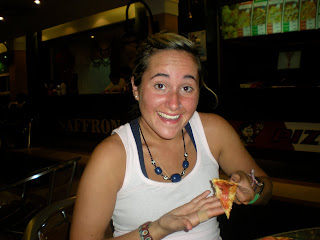standing on the corner of olympic, the front stage of kibera, we see our friend octo approaching. he is dressed nicely in dark jeans and a collared shirt with a sweater over it. from the outside looking in, you would think that he lived in a house. maybe in the city. and that he probably had a pretty stable job and income. if these were your thoughts, however, you would certainly be wrong. he lives in kibera.
kibera is the largest slum in nairobi, and the second largest slum in africa. it is home to nearly a million and a half people, all of whom pay rent to live there. kibera has thirteen different villages, is home to the olympic primary school, and houses one fifth of the two point two million kenyans who live with aids.
upon first entering kibera, in the nicest part, you think, ok, this really isn't so bad after all. but then you get deeper into it, and you reach the uganda railway line that passes through the city center, and is on top of a hill. once you reach this point and look out, there is rooftop after rooftop, as far as the eye can see. to say that this is an overwhelming sight would be the biggest understatement anyone has ever made. this vast, sprawling area, which houses twenty five percent of nairobi's population, is, in its own way, breathtaking.
while walking through different sections of kibera, it is not hard to notice that most everyone you pass looks, for the most part, extremely content with the lives they're living. adults are running their individual makeshift shops, children are getting out of school and running around with big smiles plastered on their faces. as we ask octo questions about various things we come across while we're walking, he tells us this: as much as he thinks about leaving kibera, and despite the fact that it has deteriorated so much over the years, despite the fact that at times it is not the most wonderful place to live, it is his home, and he loves it. he takes us to his house, which is a mud hut with a tin roof, and i'm surprised by how nice it seems once we're inside. something hard covers the floor so you can't see the dirt and there are big panels covering the walls for the same reason. it is very very small and there is barely any room to move. he has a twin sized bed, a coffee table, a couch and two chairs and a bulletin board covered with pictures. his younger brother lives with him as well. as we start walking back to the entrance of kibera, we pass a river that looks to be made up of mostly sewage, and is littered with trash on both sides. octo tells us that when he was younger the river was clean, and he and his friends used to swim in it. that is clearly no longer the case. as people shake his hand and call out to him while we're walking and he keeps telling us little side stories about his home, you can hear it in his voice and see it in his face. this is his home, and this is the place that he loves. the phrase that i have been hearing for my entire life, now rings true more than it ever has: home is where the heart is.























